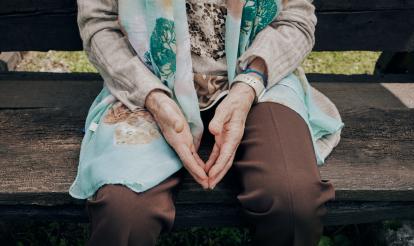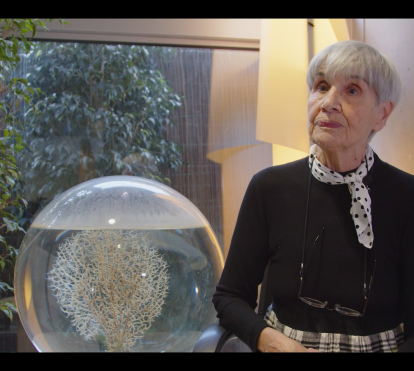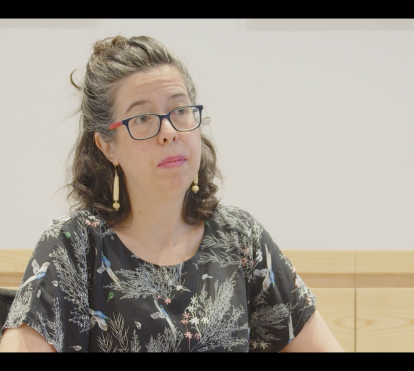
You are reading:

You are reading:

23.12.24
7 minutes readThe 21st century has been called the century of loneliness. Social changes have weakened community networks which promote collective well-being, in favour of a growing individualism. Factors such as industrialisation, the movement of rural populations to large cities and increased life expectancy contribute to situations of loneliness in all stages of life, but especially among older adults. To address this challenge, the Always Supported programme of the ”la Caixa” Foundation was launched 10 years ago.
In today’s society, initiatives such as the Always Supported programme of the ”la Caixa” Foundation, a pioneer both in tackling loneliness and in its intervention model, are key to supporting and empowering people over the age of 60 by placing them at the centre as active participants in their own ageing process. In 2024, more than 2,900 people experiencing loneliness were assisted, and according to the latest study conducted, nearly 70% of the participants reported an improvement in their emotional well-being.
The most common causes that trigger loneliness in older adults stem from significant life changes, such as retirement, emotional losses or the onset of health issues and ailments. According to Javier Yanguas, the programme’s scientific director, “the importance of confronting and knowing how to manage these life transitions is a determining factor in coping with the feelings of loneliness they generate.”
Camino Oslé, who holds a PhD in Pedagogy and is a social worker, gerontologist and member of the Bioethics Committee of Navarra, highlights two main types of factors that determine loneliness in later life: “Individual conditioning factors, centred on mobility and cognitive ability, and collective conditioning factors, which depend on social relationships.”
The gender perspective is also key to understanding loneliness, as it is more prevalent among older women. “We have a longer life expectancy than men and, therefore, suffer more from the scourges associated with old age,” says Camino Oslé, who is supported by the data: 70% of people living in residential care homes are women, according to the census of Spanish social services residential centres, compiled by the Institute for Older Adults and Social Services (IMSERSO).

In most cases, loneliness in women intensifies when their role as carers comes to an end. “Many women used to be involved in caring for their family and home. When their children leave or they become widowed, if they have not had time to create their own social network, they shut themselves away at home and fall into isolation,” she adds.
Regarding this social isolation and the possibility of building networks and personal connections, Isabel Cabrera, a professor at the Faculty of Psychology at the Autonomous University of Madrid and a researcher with the CUIDEMOS team, believes that the current socio-cultural context “plays a very important role”. The loss of neighbourhood networks and community spaces is reflected even in the structure of cities. “There are hardly any green areas or urban spaces where people can sit and share a conversation,” she points out.
The increasing individualism of today’s consumer society does not help either, as it leads to fewer and poorer-quality personal relationships. As Marino Pérez, Professor of Psychology at the University of Oviedo and author of the book El individuo flotante states, “we live in a society of floating individuals, without roots, where meaningful and lasting relationships are scarce.” Hence the importance of involving the community to re-establish lost social ties in later life.
Ageist behaviours also influence the perception of old age. Ageism, which becomes internalised over the course of life, generates a negative view of what it means to grow older and has a significant impact on ageing, potentially affecting both physical and psychological health.

In her research, Isabel Cabrera has identified that people as young as 60, who are healthy and independent, adopt these stereotypes as their own: “They begin to doubt their abilities, feel they have less control, and this leads them to stop doing things.” Among other consequences, these self-imposed behaviours result in feelings of guilt and burden, which can lead to “dependence, depressive symptoms or even cognitive decline,” says the psychologist.
Older adults sometimes do not express feelings of loneliness because they assume that being older means being alone, but “ignoring the emotion they are feeling becomes a barrier to finding help,” adds Cabrera. In her experience, these mistaken beliefs are compounded by the stigma of loneliness as a personal failure: “There is a social rejection of negative emotions, and that’s a problem because they are part of life, and the first step to move forward is to accept them.”
This “tyranny of happiness”, so prevalent today, operates as an ideology, according to Marino Pérez. “The term refers almost to an obligation to be happy, as if someone who isn’t happy simply doesn’t want to be. It is assumed that being happy is easy and a choice, but there’s certainly no science or techniques to achieve it. It becomes a tyranny when people feel forced to smile despite whatever distress they may be experiencing.”
In older adults, a prime example of this narrative of the relentless pursuit of happiness occurs during retirement. Socially, it is viewed from a very hedonistic perspective, as a major event in which to enjoy free time without obligations. However, for many people this loss of a work role and no longer feeling useful can create a significant existential void. “Some even hide their distress from their close circle because they are supposed to be happy all the time,” says the psychologist.

Old age stands in stark contrast to a society that uses youth as its standard: today, being young is synonymous with being well. Francesc Torralba, PhD in Philosophy, Theology, Pedagogy and Art History, points out that “the archetype of a man or woman presented across all media channels is young, slim, healthy and, moreover, wealthy. And everything that does not fit this archetype we try to hide in the shadows. There’s a fear of being stigmatised. Yet vulnerability is the most universal trait of the human condition: we can all be hurt. Even Achilles was vulnerable.”
According to Marino Pérez, the current challenge is to prepare new generations to know how to grow old and cope with loneliness. Joan-Carles Mèlich, who has a PhD in Philosophy and Literature from the Universitat Autònoma de Barcelona and was winner of the 2022 National Essay Prize for La fragilidad del mundo (2021), adds that “the word loneliness does not necessarily have a negative meaning, and when it does, perhaps it’s not loneliness but abandonment, which is the realisation that you don’t matter to anything or anyone.”
“It has taken a great deal of effort for us to be able to live longer. That’s why future generations must look forward to old age with hope,” insists Camino Oslé. Based on her own experience, it is necessary that from a certain age, people face ageing head-on: “Being in touch with the reality of older adults is essential for understanding what is to come.” It prepares you and gives you the tools to approach this new stage in the future “living every single day of your life, which is not about living many years, but about living them well.”